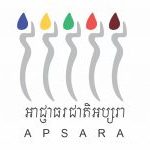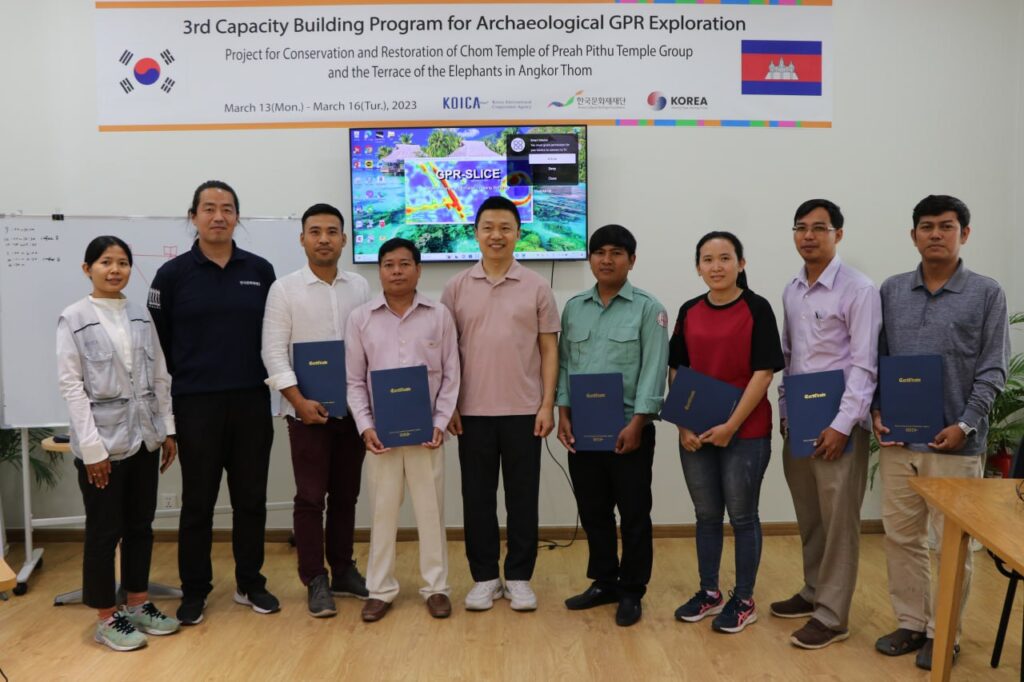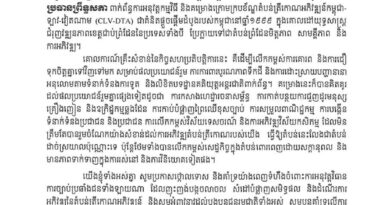វគ្គបណ្តុះបណ្តាលស្តីពី ការកសាងសមត្ថភាពលើកទី៣ ក្នុងការប្រើប្រាស់ម៉ាស៊ីន GPR (Ground Penetrating Radar) ដល់មន្ត្រី-បុគ្គលិកបច្ចេកទេសអាជ្ញាធរជាតិអប្សរាចំនួន៦នាក់ មកពីនាយកដ្ឋានអភិរក្សប្រាសាទ និងបុរាណវិទ្យា ចំនួន៤នាក់ និងនាយកដ្ឋានគ្រប់គ្រងទឹក ព្រៃឈើ និងហេដ្ឋារចនាសម្ពន្ធ ចំនួន២នាក់ សរុប៦នាក់ រយៈពេល៤ថ្ងៃ ចាប់ពីថ្ងៃទី១៣ ខែមីនា រហូតដល់ថ្ងៃទី១៦ ខែមីនា ឆ្នាំ២០២៣ បានបញ្ចប់ដោយជោគជ័យ នៅរសៀលថ្ងៃទី១៦ ខែមីនា ឆ្នាំ២០២៣។
វគ្គបណ្តុះបណ្តាលនេះ សិក្សាស្រាវជ្រាវផ្នែកបុរាណវិទ្យា ជាមួយម៉ាស៊ីន GPR ផ្តោតទៅលើការប្រើប្រាស់ម៉ាស៊ីន GPR ដើម្បីសិក្សាស្រាវជ្រាវអំពីបុរាណវត្ថុនៅក្រោមដីក្នុងតំបន់អង្គរ ដោយសិក្សាលើទ្រឹស្តី និងការអនុវត្តជាក់ស្តែងនៅទីតាំងបុរាណដ្ឋានផ្ទាល់ ដែលអាជ្ញាធរជាតិអប្សរា សហប្រតិបត្តិការជាមួយទីភ្នាក់ងារសហប្រតិបត្តិការអន្តរជាតិកូរ៉េ (KOICA) តាមរយៈមូលនិធិបេតិកភណ្ឌកូរ៉េ (KCHF)។
លោក រ៉ម វិចិត្រ មន្រ្តីបច្ចេកទេសរបស់នាយកដ្ឋានគ្រប់គ្រងទឹក ព្រៃឈើ និងហេដ្ឋារចនាសម្ពន្ធនៃអាជ្ញាធរជាតិអប្សរា បានឱ្យដឹងថា វគ្គបណ្តុះបណ្តាលនេះផ្តោតលើការប្រើប្រាស់ម៉ាស៊ីន GPR និងការវិភាគទិន្នន័យ។ ក្រៅពីរៀនទ្រឹស្តីនៅក្នុងថ្នាក់ ក៏អនុវត្តជាមួយម៉ាស៊ីន GPR នៅលើទីតាំងបុរាណដ្ឋានផ្ទាល់ និងបានយកទិន្និន័យដែលទទួលបាននោះមកវិភាគនៅក្នុងថ្នាក់ជាមួយគ្រូបង្គោលជំនាញភូគព្ភវិទូផ្នែកបុរាណវិទ្យាកូរ៉េ នៅវិទ្យាស្ថានជាតិស្រាវជ្រាវបេតិកភណ្ឌវប្បធម៌។ លោក វិចិត្របន្តថា ម៉ាស៊ីននេះ មានសមត្ថភាពអាចមើលឃើញវត្ថុនៅក្នុងដី និងបម្រែបម្រួលស្រទាប់ដីពីមួយស្រទាប់ទៅមួយស្រទាប់ អាចដឹងថាទីតាំងនោះ ជាប្រលាយ ឬជាអ្វីផ្សេងៗដែលលុបកប់បាត់នៅក្នុងដីជាយូរឆ្នាំមកហើយ ដែលយើងមើលនិងភ្នែកទទេមិនឃើញ។
បុគ្គលិកបច្ចេកទេសរបស់នាយកដ្ឋានអភិរក្សប្រាសាទ និងបុរាណវិទ្យានៃអាជ្ញាធរជាតិអប្សរា អ្នកស្រី បឿត សុប៉ាក បានឱ្យដឹងដែរថា ការប្រើប្រាស់ម៉ាស៊ីន GPR នៅក្នុងវិស័យបុរាណវិទ្យា ពិតជាទទួលបានទិន្នន័យជាក់លាក់មួយ ដើម្បីយកធ្វើជាឯកសារយោងមុននឹងកំណាយស្រាវជ្រាវអ្វីមួយ ដែលអាចចំណេញទាំងពេលវេលា និងកម្លាំងពលកម្មផង។ ទោះបី មិនច្បាស់លាស់១០០ភាគរយ តែជាផ្លូវមួយឱ្យយើងជ្រើសរើសទីតាំងស្រាវជ្រាវបានត្រឹមត្រូវ និងសុក្រិតជាងមុន។
លោក រ៉ម វិចិត្រ និងអ្នកស្រី បឿត សុប៉ាក បានបញ្ជាក់ថា ទោះបី វគ្គបណ្តុះបណ្តាលនេះ មានរយៈពេលខ្លី ក៏ប៉ុន្តែអាចយល់បាន និងបានផ្តល់នូវចំណេះដឹងច្រើនទាំងការប្រើប្រាស់ម៉ាស៊ីន GPR ព្រមទាំងមេរៀន ដែលគ្រូបង្គោលយកចិត្តទុកដាក់ទៅលើការសិក្សារបស់សិក្ខាកាមទាំងអស់គ្នា ដែលតែងតែសួរនាំ ព្យាយាមពន្យល់ លើកទឹកចិត្ត និងជំរុញដោយមិនមានភាពនឿយហត់ ដើម្បីឱ្យសិក្ខាកាមបានដើរទៅមុខបានទាំងអស់គ្នា។
សិក្ខាកាមទាំងអស់ បានថ្លែងអំណរគុណដល់អាជ្ញាធរជាតិអប្សរា និងភ្នាក់ងារសហប្រតិបត្តិការអន្តរជាតិកូរ៉េ ដែលបានបង្កើតវគ្គបណ្តុះបណ្តាលនេះឡើង និងផ្តល់ឱកាសក្នុងការសិក្សាស្វែងយល់ទទួលចំណេះដឹងថ្មី ដើម្បីអនុវត្តការងារប្រចាំថ្ងៃកាន់តែមានប្រសិទ្ធភាព។ ពិសេសសំណូមពរដល់ស្ថាប័នទាំងពីរ បន្តសហការគ្នាបណ្តុះបណ្តាលដល់មន្រ្តី-បុគ្គលិករបស់អាជ្ញាធរជាតិអប្សរាជាបន្តទៀត នាពេលអនាគត៕
អត្ថបទ និងរូបភាព៖ យី សុថា
The 3rd GPR (Ground Penetrating Radar) Capacity Building Program for six technical officers from the Department of Conservation of Monuments and Preventive Archaeology and the Department of Water, Forestry and Infrastructure Management for four days from 13-16 March 2023, completed on the afternoon of 16 March 2023.
This training course on archeological research with GPR machines focused on the use of GPR machines to study the underground archeology in the Angkor area by studying the theory and practice at the archeological site which the APSARA National Authority cooperated with the Korea International Cooperation Agency (KOICA) through the Korea Cultural Heritage Foundation (KCHF).
Mr. Rom Vichet, Technical Officer of the Department of Water, Forestry and Infrastructure Management of the APSARA National Authority, said that the training focused on the use of GPR machines and data analysis. In addition to learning the theory in the classroom, I also practiced with the GPR machine at the archeological site and analyzed the data obtained in the class with a trainer as a Korean Archaeological Geophysicist at the National Research Institute of Cultural Heritage. Mr. Vichet added that this machine can see objects in the soil and the change of soil layers as well as it could detect that the location was a canal or something that has been buried in the ground for many years.
The technical staff from the Department of Conservation of Monuments and Preventive Archaeology , Ms. Boeut Sopak, also said that the use of GPR machines in the field of archeology received specific data to be used as a reference before excavating something. We could save time and labor. Although not 100% clear, it was a way for us to choose the research location more accurately.
Mr. Rom Vichet and Ms. Boeut Sopak stated that although the training was short, it was understandable to gain a lot of knowledge on the use of GPR machines and lessons that the trainers paid attention to all participants. They asked, tried to explain, encouraged, and motivated tirelessly so that the participants could move forward together.
Participants thanked APSARA National Authority and the Korea International Cooperation Agency for setting up this training course and providing opportunities to learn and gain new knowledge to carry out daily work more effectively. In particular, the request to the two institutions to continue to cooperate in training officials and staff of the APSARA National Authority in the future.
Article and Photos: Yi Sotha





